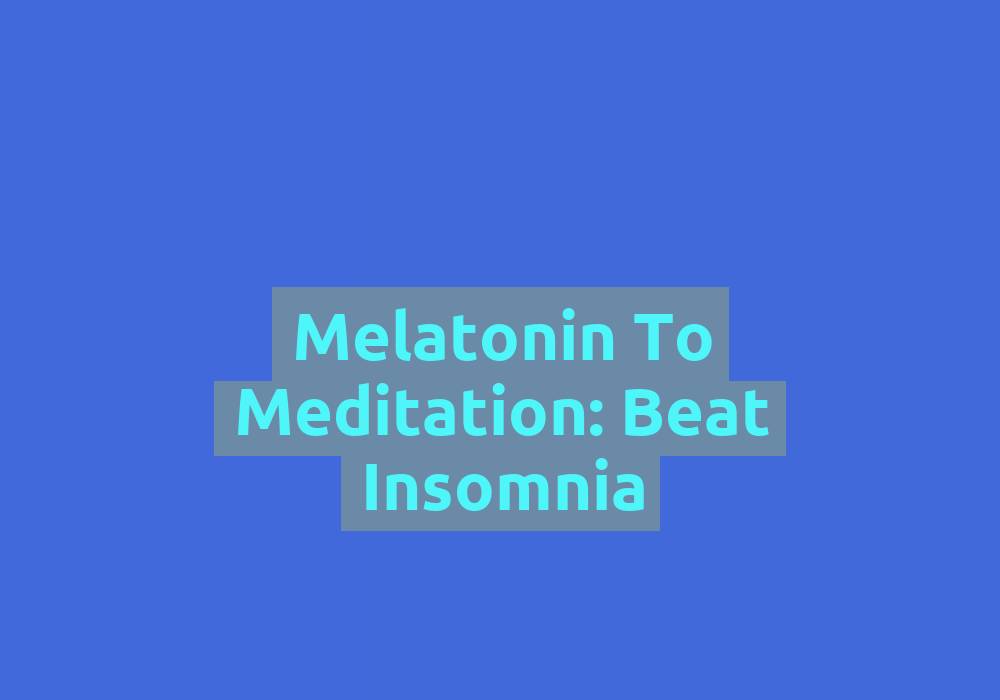Insomnia Battle: Reclaim Your Restful Night

Insomnia is a common sleep disorder that affects millions of people worldwide, causing frustration and hindering their ability to fall asleep or stay asleep throughout the night. This leads to daytime fatigue, irritability, and other negative impacts on overall well-being. However, there is hope! With the right strategies and lifestyle adjustments, you can reclaim your restful night and defeat insomnia once and for all. In this article, we will explore various methods and techniques to help you overcome insomnia and achieve a good night’s sleep.
Understanding Insomnia
Before diving into the strategies, it is essential to understand what insomnia is and what causes it. Insomnia is characterized by difficulty falling asleep, staying asleep, or both. It can be acute, lasting for a short period, or chronic, lasting for several weeks or even months.
Several factors contribute to the development of insomnia, including:
- Stress and anxiety: High levels of stress or anxiety can make it challenging to relax and fall asleep. Consider implementing stress-reduction techniques such as deep breathing exercises, mindfulness meditation, or yoga before bedtime.
- Poor sleep habits: Irregular sleep schedule, excessive napping, and inconsistent bedtime routines can disrupt your sleep patterns. Establishing a regular sleep schedule and sticking to it can help regulate your body’s internal clock and improve sleep.
- Environmental factors: Noise, excessive light, uncomfortable bedding, and an unsuitable sleep environment can all contribute to insomnia. Consider using earplugs, blackout curtains, and investing in a comfortable mattress and pillows to create an optimal sleep environment.
- Medical conditions: Certain medical conditions like chronic pain, allergies, gastrointestinal issues, and respiratory problems may interfere with sleep. It is important to address and manage these underlying conditions to improve sleep quality.
- Medications and substances: Certain medications, caffeine, nicotine, and alcohol can disrupt your sleep patterns. Avoid consuming caffeine and nicotine close to bedtime, and consider limiting or avoiding alcohol altogether.
Lifestyle Adjustments for Better Sleep
Making specific lifestyle adjustments can significantly improve your chances of overcoming insomnia and enjoying a restful night’s sleep. Here are some tips to consider:
Establish a Consistent Sleep Schedule
Maintaining a regular sleep schedule is crucial for regulating your body’s internal clock. Try to go to bed and wake up at the same time every day, even on weekends. Consistency helps program your brain and body to follow a predictable sleep-wake cycle, making it easier to fall asleep and wake up refreshed.
Create a Relaxing Bedtime Routine
Engaging in activities that promote relaxation before bed can signal to your body that it’s time to wind down. Consider incorporating calming activities into your bedtime routine, such as reading a book, taking a warm bath, practicing meditation or deep breathing exercises, or listening to soothing music. These activities can help reduce stress and prepare your mind and body for sleep. Avoid stimulating activities, like using electronic devices or watching stimulating content, as they can interfere with your ability to fall asleep.
Optimize Your Sleep Environment
Your sleep environment plays a significant role in promoting quality sleep. Make sure your bedroom is dark, quiet, and at a comfortable temperature. Consider using blackout curtains, earplugs, or a white noise machine to create a peaceful atmosphere. Additionally, invest in a supportive mattress, comfortable pillows, and breathable bedding to enhance your comfort and minimize any discomfort that could disrupt your sleep. Creating a sleep-friendly environment can help set the stage for a restful night’s sleep.
Limit Daytime Napping
While short power naps can be beneficial, excessive daytime napping can interfere with your ability to sleep at night. If you’re struggling with insomnia, it’s best to avoid daytime napping altogether. If you must nap, limit it to no more than 20-30 minutes and avoid napping too close to your bedtime. Napping for longer periods or too close to bedtime can disrupt your sleep schedule and make it harder to fall asleep at night.
Avoid Stimulants and Alcohol
Stimulants like caffeine and nicotine can keep you awake, so it’s best to limit or avoid them, especially in the afternoon and evening. Caffeine, commonly found in coffee, tea, chocolate, and some medications, can have a stimulating effect that can interfere with sleep. Nicotine, often present in tobacco products, is also a stimulant that can disrupt sleep patterns. It’s advisable to avoid consuming caffeine and nicotine close to bedtime. Additionally, while alcohol may initially make you feel drowsy, it can disrupt your sleep patterns and prevent you from achieving deep, restorative sleep. It’s best to avoid consuming alcohol close to bedtime to ensure a better quality of sleep.
Healthy Habits for Sound Sleep
In addition to lifestyle adjustments, there are several healthy habits that can contribute to better sleep quality. Consider incorporating the following practices into your daily routine:
Regular Exercise
Regular physical activity can have a positive impact on your sleep. Engaging in moderate-intensity exercise for at least 30 minutes a day can help regulate your sleep patterns and promote overall well-being. Exercise releases endorphins, reduces stress, and enhances mood, all of which can contribute to better sleep. However, try to avoid vigorous exercise close to bedtime, as it may stimulate your body and make it harder to fall asleep. Aim for exercise earlier in the day to maximize its benefits on sleep.
Balanced Diet
Maintaining a balanced diet that includes a variety of fruits, vegetables, whole grains, and lean proteins can support healthy sleep. These foods provide essential nutrients and minerals that promote optimal sleep and overall well-being. Avoid heavy or rich meals close to bedtime, as they may cause discomfort and disrupt your sleep. Additionally, limit your fluid intake in the evening to avoid frequent trips to the bathroom during the night. A well-balanced diet can contribute to better sleep quality and overall health.
Manage Stress
High levels of stress and anxiety are common culprits of insomnia. Finding healthy ways to manage stress is crucial for improving sleep quality. Consider incorporating stress-reduction techniques into your daily routine, such as practicing relaxation techniques like deep breathing exercises, engaging in hobbies or activities that bring you joy, talking to a supportive friend or family member, or seeking professional help if needed. Taking steps to reduce stress can significantly improve your sleep quality and overall well-being.
Create a Sleep-Friendly Bedroom
Your bedroom should be a sanctuary dedicated to sleep and relaxation. Keep it clean, clutter-free, and well-organized. Remove electronic devices such as televisions and computers from your bedroom, as they emit blue light that can interfere with your sleep. Blue light suppresses the production of melatonin, a hormone that regulates sleep. Instead, opt for soft, warm lighting and use your bedroom solely for sleep and intimacy. Creating a sleep-friendly bedroom environment can help promote better sleep and ensure a restful night.
Seeking Professional Help
If your insomnia persists despite implementing lifestyle adjustments and healthy sleep habits, it may be beneficial to seek professional help. A healthcare provider or sleep specialist can conduct a thorough evaluation and recommend appropriate treatments to address your specific sleep issues. They may suggest cognitive-behavioral therapy for insomnia (CBT-I), which is a type of psychotherapy that targets the underlying causes of insomnia and helps develop healthy sleep habits. In some cases, medication may be prescribed to help manage insomnia symptoms. The healthcare professional will determine the best course of action based on the severity and underlying causes of your insomnia.
Remember, everyone’s experience with insomnia is unique, and it may take some time to find the strategies that work best for you. Be patient and persistent in your efforts to reclaim your restful night. With the right approach and a commitment to healthy sleep practices, you can overcome insomnia and enjoy the rejuvenating sleep you deserve.
Disclaimer: This article is for informational purposes only and does not constitute medical advice. Please consult with a healthcare professional for personalized guidance and treatment options for insomnia or any other medical condition.
FAQ
1. What is insomnia and what are its characteristics?
Insomnia is a sleep disorder characterized by difficulty falling asleep, staying asleep, or both. It can be acute (short-term) or chronic (lasting for several weeks or months).
2. What are the factors that contribute to the development of insomnia?
Several factors contribute to the development of insomnia, including stress and anxiety, poor sleep habits, environmental factors, medical conditions, and medications/substances.
3. What lifestyle adjustments can help improve sleep quality?
Some lifestyle adjustments that can improve sleep quality include establishing a consistent sleep schedule, creating a relaxing bedtime routine, optimizing the sleep environment, and limiting daytime napping.
4. What healthy habits can contribute to better sleep quality?
Regular exercise, a balanced diet, stress management, and creating a sleep-friendly bedroom are healthy habits that can contribute to better sleep quality.




